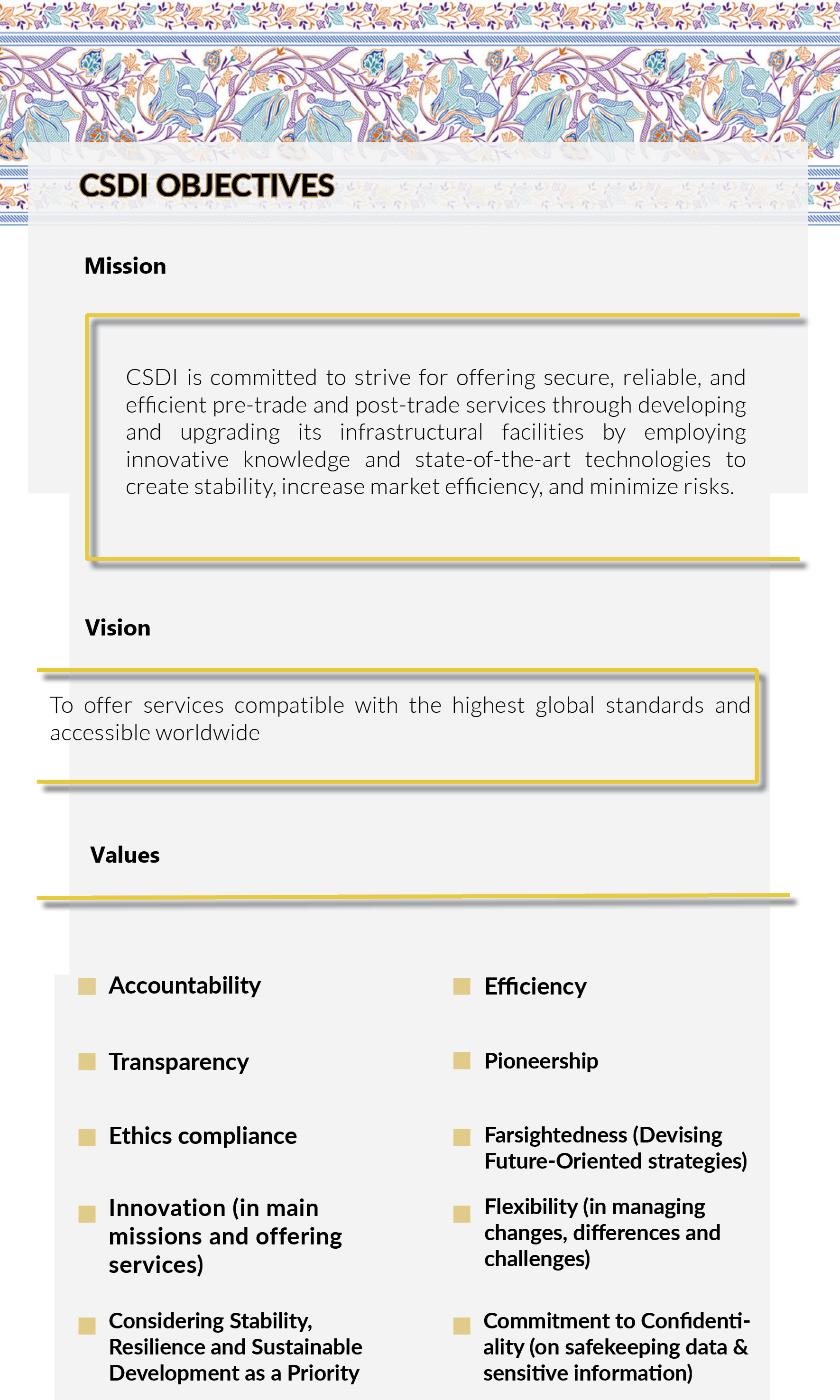
Features of Strategic Plan and Development Measures at CSDI
The success of a company or organization is not only about choosing the right strategies but turning the strategy into an operational plan is the crucial factor in getting the desired result from strategic planning. No matter how suitable and effective the selected strategies are, they are doomed to fail if they are not appropriately implemented.
- Focus on Corporate Sustainability
Today, a new format for formulating and evaluating strategies, plans, and approaches in the global financial markets leads to corporate sustainability.
Corporate sustainability is considered a principle in financial markets, and many indicators are even designed for the external evaluation of companies' behavior.
Organizational sustainability is an approach that considers the long-term values of stakeholders by implementing a business strategy that includes all aspects of the organization's activity in the ethical, social, environmental, cultural, and economic fields.
This approach also designs strategies based on transparency and individual development of company staff for the long-term continuity of the company's activity and survival.
Organizational sustainability is an evolution in strategies and approaches that explain the ethical behavior of companies towards society. This fact can be easily seen in corporate values.
The ongoing challenge for many new businesses is determining the positive effects of sustainability.
Sustainability can increase income, reduce energy costs, waste production, consumption materials, and costs associated with water use, recruitment and layoff expenses, and strategic and operational risks as it increases employee productivity.
In addition, sustainable business practices can attract talented people and act in the direction of eliminating a good number of costs, such as creating tax exemptions that governments allocate to sustainable businesses as incentives.
- Transparency
Transparency is based on the belief that having an attractive and open environment in the company and the society as well improves efficiency and leads to a new level of profitability.
Transparency means benefiting from an open culture that promotes participation, innovation, and creativity of staff while facilitating access to community resources (which creates a much larger team that is much cheaper at the same time); however, this approach also makes the behavior and performance of the company to be evaluated from all viewpoints (360-degree evaluation).
This will lead to the formation of social capital for the company. Social capital creates a higher brand value, sales and profitability, trust, and credibility for the company.
The trust and credibility of all stakeholders are the keys to the survival and development of CSDI's activities. To gain social support through these approaches, the best solution is open communication with stakeholders and disclosing a high level of clear and accurate information.
- Interaction with Stakeholders
Sustainability involves understanding the internal and external environmental and social effects. This requires participation and interaction with stakeholders to understand their impacts and concerns.
Among the moves that the company can make internally, it can reduce the negative impact created by its products and services through in-service training for its staff and efforts to apply technology and reform the structure (to improve efficiency and effectiveness). Participation in philanthropic and environmental social activities strengthens employees' commitment to the corporate sustainability policy.
Speaking externally, the company's most immediate and appropriate stakeholders for interaction are customers, suppliers, associations, and non-governmental organizations.
- Progressive/Futuristic Thinking
Companies can usually take steps towards sustainability by implementing new creative ideas (such as using technologies while committing to preserving the environment and respecting social values).
The use of clean energies in running the organization, the deployment of electronic mechanisms (for example, an electronic platform for the company's general meetings, and dematerialization of internal and external correspondence, etc.) are examples of such approaches.
In the new versions and definitions of the optimal corporate governance system, the experts raised the idea of forming a sustainability committee along with the adaptation committee.
The Internet of Things in the fourth industrial revolution, or other technological fields, which form the ongoing industrial transition, must be considered by the policymakers and those who draft the company's horizons.
- Value-Added Services
Many of the main activities of Central Securities Depository of Iran in the pre-trade and post-trade areas can come under redefining and reformulation of ancillary value-added services.
In view of the company's current approach to fast-forward the implementation of the release of the Justice-Shares scheme, the possibility of defining and explaining the company's value-added service programs has been created, and tasks such as dividend distribution, holding electronic general meetings, providing asset custodian services, and ID authentication of investors and other capital market stakeholders also come under this category.
|
|

|
|


